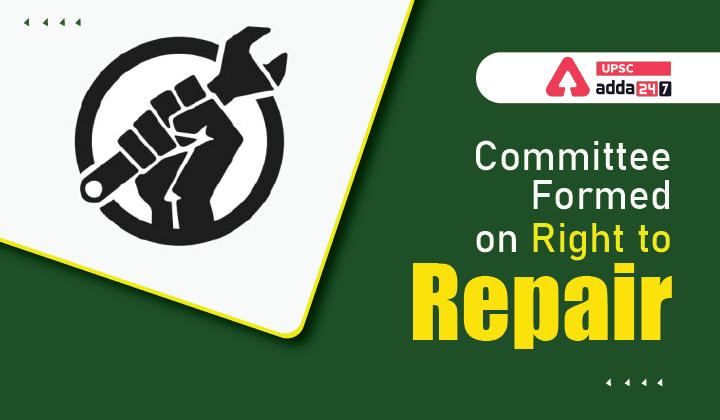Table of Contents
Right to repair UPSC: Relevance
- GS 2: Government policies and interventions for development in various sectors and issues arising out of their design and implementation.
Right to repair: Context
- The Union Government has set up a committee headed by Nidhi Khare, to develop a comprehensive framework on the Right to Repair and identified “important sectors” to implement it.
Right to repair in India: Key points
- The mandate of the committee is to cut down restrictive practices introduced by some manufacturers so that people can get goods such as consumer durables, phones and cars fixed on their own.
- The sectors identified for the implementation includes Farming Equipment, Mobile Phones/ Tablets, Consumer Durables and Automobiles/Automobile Equipment.
Right to repair: Issues highlighted by the committee
- The committee pointed to practices such as planned obsolescence and creation of monopolies on spare parts while stressing on the need to give consumers the right to choose how they get products fixed.
- Planned obsolescence is a system whereby the design of any gadget is such that it lasts a particular time only and after that particular period it has to be mandatorily replaced.
- The committee also flagged how consumers often lose the right to claim a warranty if they get a product repaired from a “non-recognized” outfit.
- Companies often avoid the publication of manuals that can help users make repairs easily.
- Manufacturers have proprietary control over spare parts (regarding the kind of design they use for screws and other).
What is right to repair?
- Right to repair meaning: Right to repair is the legal concept that allows consumers to repair the products they buy or choose their own service providers instead of going through the manufacturer.
- The rationale behind the “right to repair” is that the individual who purchases a product must own it completely.
- This implies that apart from being able to use the product, consumers must be able to repair and modify the product the way they want to.
Right to repair: Scope of the right
- Complex machinery: We use complex machinery as compared to the past. For instance, air conditioners have largely replaced fans and coolers. An entire repair class is denied its right to conduct business as it does not have the tools, parts, guidelines and technical know-how to repair these high-tech products.
- Lack of certification: Further, the lack of certification/licensing of repair workers is seen as a reflection of their lack of skills.
- Quality of the product: Manufacturers claim that the quality and functioning of the product might be adversely affected if they allow repairs by consumers and third parties. The fear of manufacturers is so potent that they incorporate warranty clauses which lapse when the product is repaired by a third party.
- Manufacturers reduce the durability of the product, compelling consumers to either repurchase the product or get it repaired at exorbitant prices affixed by the manufacturers.
Right to repair India: Recommendations
- A repair certification/licence can be allotted to those who pass certain criteria and skill tests. In addition to protecting their right to livelihood, it may also prove beneficial as tech companies are required to share their repair manuals with certified technicians.
- While necessary clauses to maintain the quality of the product can be included, a blanket waiver should be avoided. For instance, the quality assurance clause can be incorporated for use of company-recommended spare parts and certified repair shops.
- Manufacturers can sign a non-disclosure agreement to protect the IP with the certified repairers/businesses. Customers with access to genuine parts may also approach independent repair providers who may not offer the original manufacturer’s warranty but their own warranty.
Read current affairs for UPSC





 TSPSC Group 1 Question Paper 2024, Downl...
TSPSC Group 1 Question Paper 2024, Downl...
 TSPSC Group 1 Answer key 2024 Out, Downl...
TSPSC Group 1 Answer key 2024 Out, Downl...
 UPSC Prelims 2024 Question Paper, Downlo...
UPSC Prelims 2024 Question Paper, Downlo...
